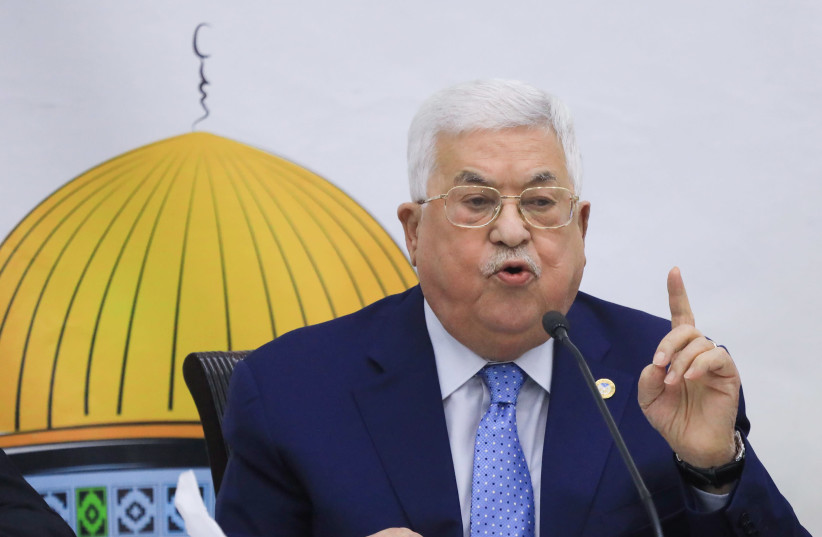Nixing elections will harm Abbas, reignite Fatah-Hamas dispute – analysis
Many Palestinians are convinced that the deep crisis in Fatah is the main reason behind Abbas’s fear of holding the elections.
By KHALED ABU TOAMEH
APRIL 27, 2021 20:57

Palestinian President Mahmoud Abbas makes a statement as he attends the Revolutionary Council Meeting of Fatah Movement at the Palestinian Presidential Office in Ramallah, on December 18, 2019.
(photo credit: FLASH90)
Advertisement
A decision to cancel the Palestinian parliamentary and presidential elections further undermine the credibility of Palestinian Authority President Mahmoud Abbas and his ruling Fatah faction, Palestinians said Tuesday.
The decision will also solidify the split between the West Bank and Gaza Strip and reignite the power struggle between Fatah and Hamas, they added.
Leaders of several Palestinian factions are scheduled to meet on Thursday evening in Ramallah, where Abbas is expected to announce his decision to postpone the elections indefinitely on the pretext that Israel was refusing to allow the vote to take place in Jerusalem.
As part of the effort to prepare the Palestinian public for the announcement, PA officials on Tuesday claimed Israel has “verbally informed” the Palestinian leadership of its refusal to allow the elections to take place in Arab neighborhoods under Israeli sovereignty in Jerusalem.
Several Palestinian factions and candidates have voiced strong opposition to the postponement or cancellation of the elections.
Accusing Abbas of cynically using the dispute over the vote in Jerusalem as an excuse not to hold the elections, they insisted that the elections should take place on time.
According to Palestinian sources, Abbas has notified Egypt, Jordan, Qatar and other Arab countries of his intention to delay the elections until further notice because of Israel’s alleged refusal to allow Jerusalem Arabs to cast their ballots inside the city.





Many Palestinians, nonetheless, are convinced that the deep crisis in Fatah is the main reason behind Abbas’s fear of holding the elections.
Fatah is running in the parliamentary election on three separate lists: one dominated by Abbas loyalists; a second belonging to Nasser al-Kidwa, who is a nephew of former PLO leader Yasser Arafat, and jailed Fatah leader Marwan Barghouti; and a third affiliated with exiled Fatah operative Mohammad Dahlan.
Abbas is afraid of his rivals in Fatah more than Hamas.
Indeed, the split in Fatah will benefit Hamas, whose candidates are running on a unified slate called “Jerusalem is Our Destiny.”
But Abbas is less worried about Hamas controlling the parliament. Hamas does not have its eyes set on the PA presidency. As far as Abbas is concerned, the real challenge he is facing is from veteran Fatah leaders such as Kidwa, Barghouti and Dahlan. He is particularly worried that many other Fatah activists have joined the Kidwa-Barghouti alliance and the Dahlan camp.
Delaying the elections will intensify the crisis in Fatah and alienate some of the faction’s senior Abbas loyalists, especially Jibril Rajoub. Such a move will also drive many Palestinians into the open arms of Abbas’s rivals in Fatah.
Rajoub, secretary-general of the Fatah Central Committee, the faction’s highest decision-making body, was the engineer of the agreement with Hamas to hold the long-overdue general elections. Rajoub, according to Palestinian sources, was hoping that the Fatah-Hamas rapprochement would bolster his standing among the Palestinians and improve his chances of succeeding the 85-year-old Abbas.
Rajoub was hoping to take credit for ending the Fatah-Hamas dispute, reuniting the West Bank and Gaza Strip, and organizing the first general elections in 15 years.
RAJOUB IS said to be opposed to the cancellation of the elections for fear that such a move would destroy the agreement he reached with Hamas leaders over the past eight months in Turkey, Qatar and Egypt.
A veteran Fatah official said he did not rule out the possibility that Rajoub would submit his resignation from the Fatah Central Committee if and when the elections are called off.
Hussein al-Sheikh, head of the PA General Authority for Civil Affairs, and Majed Faraj, head of the PA’s General Intelligence Service, were opposed to Rajoub’s efforts to achieve “national reconciliation” with Hamas and hold new elections under the current circumstances, the official said.
Sheikh and Faraj, along with some veteran members of the Fatah Central Committee, are also said to be wary of Rajoub’s growing influence over Abbas.
“The cancellation of the elections will be seen as a serve blow to Rajoub because they are his baby,” said another Fatah official.
Palestinian political analysts believe cancellation of the elections will further erode the Palestinian public’s confidence in Abbas and Fatah. Public opinion polls have shown that more than 60% of Palestinians would like to see Abbas step down.
The cancellation of the elections will also be seen as a major blow to hundreds of young candidates who have long been waiting for an opportunity to have a say in the Palestinian decision-making process.
Thirty-six lists have registered for the May 22 elections with the hope of reviving parliamentary life in the West Bank and Gaza Strip. The PLC has been effectively paralyzed since the Hamas takeover of the Gaza Strip in the summer of 2007. Most of these lists have already come out against the possible cancellation of the elections, dubbing it a “crime” against Palestinian democracy.
By calling off the elections, Abbas will provide his political rivals and critics with an excuse to question his right to make important decisions on behalf of the Palestinians, particularly in light of talk about a possible resumption of peace negotiations with Israel. Elected in 2005 for a four-year term, Abbas has long been facing allegations that he is no longer a legitimate leader.
The Fatah-Hamas agreement on the elections was seen by some Palestinians as an opportunity to end the rivalry between the two parties. Fatah and Hamas agreed to stop arresting each other’s members in the West Bank and Gaza Strip. They also agreed to stop attacking each other through public statements and the media. Now the honeymoon is likely to end with the cancellation of the elections.
Some Hamas leaders have already resumed their criticism of Abbas. Musa Abu Marzouk, a senior Hamas official, said Fatah infighting, not the controversy over Jerusalem, was the real reason behind Abbas’s reported intention to call off the elections. “We heard this from senior Fatah officials and some international parties,” he said.
Ismail Radwan, another senior Hamas official, warned that cancellation of the elections would create “a political vacuum, chaos and frustration.”
These statements are likely to anger Abbas and prompt him to order the PA security forces to resume their crackdown on Hamas members in the West Bank.
Abbas may be able to prevent a Hamas-led uprising in the West Bank, but the question is whether he will succeed in preventing a revolt by disgruntled Fatah members and other Palestinians who are evidently fed up with his authoritarian rule.
